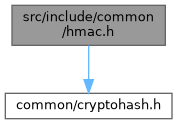#include "common/cryptohash.h"

Go to the source code of this file.
Typedefs | |
| typedef struct pg_hmac_ctx | pg_hmac_ctx |
Functions | |
| pg_hmac_ctx * | pg_hmac_create (pg_cryptohash_type type) |
| int | pg_hmac_init (pg_hmac_ctx *ctx, const uint8 *key, size_t len) |
| int | pg_hmac_update (pg_hmac_ctx *ctx, const uint8 *data, size_t len) |
| int | pg_hmac_final (pg_hmac_ctx *ctx, uint8 *dest, size_t len) |
| void | pg_hmac_free (pg_hmac_ctx *ctx) |
| const char * | pg_hmac_error (pg_hmac_ctx *ctx) |
Typedef Documentation
◆ pg_hmac_ctx
Function Documentation
◆ pg_hmac_create()
|
extern |
Definition at line 77 of file hmac.c.
References ALLOC, pg_hmac_ctx::block_size, CurrentResourceOwner, pg_hmac_ctx::digest_size, ereport, errcode(), errmsg(), pg_hmac_ctx::error, ERROR, pg_hmac_ctx::errreason, explicit_bzero(), fb(), FREE, pg_hmac_ctx::hash, pg_hmac_ctx::hmacctx, MD5_BLOCK_SIZE, MD5_DIGEST_LENGTH, pg_cryptohash_create(), PG_HMAC_ERROR_NONE, PG_MD5, PG_SHA1, PG_SHA224, PG_SHA224_BLOCK_LENGTH, PG_SHA224_DIGEST_LENGTH, PG_SHA256, PG_SHA256_BLOCK_LENGTH, PG_SHA256_DIGEST_LENGTH, PG_SHA384, PG_SHA384_BLOCK_LENGTH, PG_SHA384_DIGEST_LENGTH, PG_SHA512, PG_SHA512_BLOCK_LENGTH, PG_SHA512_DIGEST_LENGTH, ResourceOwnerEnlarge(), ResourceOwnerRememberHMAC(), pg_hmac_ctx::resowner, SHA1_BLOCK_SIZE, SHA1_DIGEST_LENGTH, type, and pg_hmac_ctx::type.
Referenced by build_server_final_message(), calculate_client_proof(), scram_ClientKey(), scram_SaltedPassword(), scram_ServerKey(), verify_client_proof(), and verify_server_signature().
◆ pg_hmac_error()
|
extern |
Definition at line 306 of file hmac.c.
References _, Assert, pg_hmac_ctx::error, pg_hmac_ctx::errreason, fb(), PG_HMAC_ERROR_DEST_LEN, PG_HMAC_ERROR_INTERNAL, PG_HMAC_ERROR_NONE, PG_HMAC_ERROR_OOM, and PG_HMAC_ERROR_OPENSSL.
Referenced by build_server_final_message(), calculate_client_proof(), scram_ClientKey(), scram_SaltedPassword(), scram_ServerKey(), verify_client_proof(), and verify_server_signature().
◆ pg_hmac_final()
|
extern |
Definition at line 244 of file hmac.c.
References ALLOC, pg_hmac_ctx::block_size, pg_hmac_ctx::digest_size, pg_hmac_ctx::error, pg_hmac_ctx::errreason, fb(), FREE, pg_hmac_ctx::hash, pg_hmac_ctx::hmacctx, pg_hmac_ctx::k_opad, len, MD5_DIGEST_LENGTH, pg_cryptohash_error(), pg_cryptohash_final(), pg_cryptohash_init(), pg_cryptohash_update(), PG_HMAC_ERROR_DEST_LEN, PG_HMAC_ERROR_INTERNAL, PG_HMAC_ERROR_OOM, PG_HMAC_ERROR_OPENSSL, PG_MD5, PG_SHA1, PG_SHA224, PG_SHA224_DIGEST_LENGTH, PG_SHA256, PG_SHA256_DIGEST_LENGTH, PG_SHA384, PG_SHA384_DIGEST_LENGTH, PG_SHA512, PG_SHA512_DIGEST_LENGTH, SHA1_DIGEST_LENGTH, SSLerrmessage(), and pg_hmac_ctx::type.
Referenced by build_server_final_message(), calculate_client_proof(), scram_ClientKey(), scram_SaltedPassword(), scram_ServerKey(), verify_client_proof(), and verify_server_signature().
◆ pg_hmac_free()
|
extern |
Definition at line 289 of file hmac.c.
References explicit_bzero(), fb(), FREE, pg_hmac_ctx::hash, pg_hmac_ctx::hmacctx, pg_cryptohash_free(), ResourceOwnerForgetHMAC(), and pg_hmac_ctx::resowner.
Referenced by build_server_final_message(), calculate_client_proof(), ResOwnerReleaseHMAC(), scram_ClientKey(), scram_SaltedPassword(), scram_ServerKey(), verify_client_proof(), and verify_server_signature().
◆ pg_hmac_init()
|
extern |
Definition at line 138 of file hmac.c.
References ALLOC, block_size, pg_hmac_ctx::block_size, pg_hmac_ctx::digest_size, pg_hmac_ctx::error, pg_hmac_ctx::errreason, fb(), FREE, pg_hmac_ctx::hash, HMAC_IPAD, HMAC_OPAD, pg_hmac_ctx::hmacctx, i, pg_hmac_ctx::k_ipad, pg_hmac_ctx::k_opad, len, pg_cryptohash_create(), pg_cryptohash_error(), pg_cryptohash_final(), pg_cryptohash_free(), pg_cryptohash_init(), pg_cryptohash_update(), PG_HMAC_ERROR_INTERNAL, PG_HMAC_ERROR_OOM, PG_HMAC_ERROR_OPENSSL, PG_MD5, PG_SHA1, PG_SHA224, PG_SHA256, PG_SHA384, PG_SHA512, SSLerrmessage(), and pg_hmac_ctx::type.
Referenced by build_server_final_message(), calculate_client_proof(), scram_ClientKey(), scram_SaltedPassword(), scram_ServerKey(), verify_client_proof(), and verify_server_signature().
◆ pg_hmac_update()
|
extern |
Definition at line 223 of file hmac.c.
References data, pg_hmac_ctx::error, pg_hmac_ctx::errreason, fb(), pg_hmac_ctx::hash, pg_hmac_ctx::hmacctx, len, pg_cryptohash_error(), pg_cryptohash_update(), PG_HMAC_ERROR_INTERNAL, PG_HMAC_ERROR_OPENSSL, and SSLerrmessage().
Referenced by build_server_final_message(), calculate_client_proof(), scram_ClientKey(), scram_SaltedPassword(), scram_ServerKey(), verify_client_proof(), and verify_server_signature().